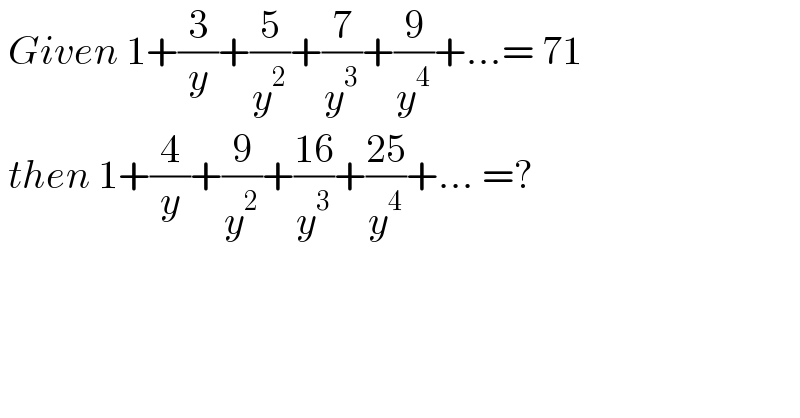
Question and Answers Forum
Question Number 157454 by tounghoungko last updated on 23/Oct/21

Answered by FongXD last updated on 23/Oct/21
![let 1+(3/y)+(5/y^2 )+(7/y^3 )+(9/y^4 )+...=71 be equation (1) and 1+(4/y)+(9/y^2 )+((16)/y^3 )+((25)/y^4 )+...=M be equation (2) take (2)−(1): (1+(4/y)+(9/y^2 )+((16)/y^3 )+((25)/y^4 )+...)−(1+(3/y)+(5/y^2 )+(7/y^3 )+(9/y^4 )+...)=M−71 ⇔ M−71=(1/y)+(4/y^2 )+(9/y^3 )+((16)/y^4 )+((25)/y^5 )+... ⇔ M−71=(M/y), ⇒ M=((71y)/(y−1)) we have (1): 1+(3/y)+(5/y^2 )+(7/y^3 )+(9/y^4 )+...=71 ⇔ (1+(1/y)+(1/y^2 )+...)+2((1/y)+(1/y^2 )+(1/y^3 )+...)+2((1/y^2 )+(1/y^3 )+(1/y^4 )+...)+...=71 ⇔ (1/(1−(1/y)))+((2∙(1/y))/(1−(1/y)))+((2∙(1/y^2 ))/(1−(1/y)))+((2∙(1/y^3 ))/(1−(1/y)))+...=71 ⇔ −1+2(1+(1/y)+(1/y^2 )+(1/y^3 )+...)=71(1−(1/y)) ⇔ −1+(2/(1−(1/y)))=71(1−(1/y)) ⇔ 71(1−(1/y))^2 +(1+(1/y))−2=0 ⇔ 1−(1/y)=((−1+(√(569)))/(142)), [∵ 0<(1/y)<1] ⇒ y=((142)/(143−(√(569)))) we get: M=((71(((142)/(143−(√(569))))))/(((142)/(143−(√(569))))−1))=((71×142)/(142−(143−(√(569)))))=((10082)/( (√(569))−1)) ⇒ 1+(4/y)+(9/y^2 )+((16)/y^3 )+((25)/y^4 )+...=((5041((√(569))+1))/(284))](Q157460.png)
Commented by Tawa11 last updated on 23/Oct/21

Commented by FongXD last updated on 23/Oct/21

Answered by qaz last updated on 23/Oct/21
![Σ_(n=0) ^∞ ((2n+1)/y^n ) ,(∣(1/y)∣<1) =(2xD+1)∣_(x=1/y) (1/(1−x)) =[((1+x)/((1−x)^2 ))]_(x=1/y) =((y(1+y))/((1−y)^2 ))=71 ⇒(1/y)=((140)/(143+(√(569)))) Σ_(n=0) ^∞ (((n+1)^2 )/y^n ) =(x^2 D^2 +3xD+1)∣_(x=1/y) (1/(1−x)) =[((2x^2 )/((1−x)^3 ))+((3x)/((1−x)^2 ))+(1/(1−x))]_(x=1/y) =[((2x^2 )/((1−x)^3 ))+(x/((1−x)^2 ))+((1+x)/((1−x)^2 ))]_(x=1/y) =[((x^2 +x)/((1−x)^3 ))]_(x=1/y) +71 =71[(x/(1−x))]_(x=1/y) +71 =((71)/4)((√(569))+1)](Q157472.png)
Commented by tounghoungko last updated on 24/Oct/21

